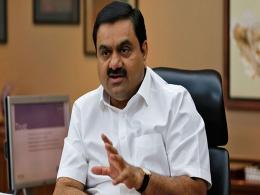Fitch Ratings on Tuesday lowered India's GDP growth forecast for this fiscal to 6.9 per cent from 7.4 per cent, saying there will be "temporary disruptions" to economic activity post demonetisation.
It said economic activity will be hit in the October- December quarter because of the cash crunch created by withdrawal and replacement of 500 and 1000 rupee notes that accounted for 86 per cent of the value of currency in circulation.
"Indian growth has also been revised down to reflect temporary disruptions to activity related to the RBI's surprise demonetisation of large-denomination bank notes," Fitch said, as it revised real GDP growth forecast down to 6.9 per cent for 2016-17, from 7.4 per cent projected earlier.
The US-based ratings agency also revised GDP growth forecast for 2017-18 and 2018-19 lower to 7.7 per cent from 8 per cent earlier.
"Gradual implementation of the structural reform agenda is expected to contribute to higher growth, as will higher real disposable income, supported by an almost 24 per cent hike in civil servants' wages.
"But the anticipated recovery in investment looks a bit less certain in light of ongoing weakness in the data," Fitch said in its 'Global Economic Outlook - November' report.
Regarding currency ban, it said consumers do not have the cash needed to complete purchases, and there have been reports of supply chains being disrupted and farmers unable to buy seeds and fertiliser for the sowing season.
"Time spent queueing in banks is also likely to have affected general productivity. The impact on GDP growth will increase the longer the disruption continues," Fitch said, adding the medium-term effect of the currency withdrawal on GDP growth is uncertain, but is unlikely to be large.
"Most importantly, demonetisation is a one-off event.
People who operate in the informal sector will still be able to use the new high-denomination bills and other options (such as gold) to store their wealth," it added.
Fitch said there are no new incentives for people to avoid cash transactions and the informal sector could soon go back to business as usual.
Post the demonetisation announcement on November 8, the government and banks have been taking several steps to push digital transactions.
Fitch said it expects RBI's 1.50 per cent policy rate cuts since the beginning of 2015 to feed through to higher GDP growth, even though monetary transmission has been impaired by relatively weak banking sector health.
"A surge in low-cost funding due to the demonetisation may remove a constraint on banks that prevented lending rates from keeping pace with the RBI's policy rate cuts in recent years, although this will depend on deposits remaining in banks beyond the next few months," it said.
Populism, anti-establishment mood to hit global growth
A surge in populism and anti- establishment sentiment will push the world into an era of economic nationalism to the detriment of long-term global growth, Fitch Ratings said today.
In its Global Economic Outlook (GEO) for 2017, it said there is little doubt that increased trade protectionism and weaker migration flows will dampen growth in the advanced economies in the long term even though short-term budgetary measures are likely provide a boost for next year.
"The surge in populism and anti-establishment sentiment witnessed in the Brexit vote and Donald Trump's victory in the US presidential election seem likely to push structural policies in the direction of economic nationalism, entailing a reduction in trade openness and international labour migration," said the global credit ratings firm.
At the same time, electoral expressions of discontent are pushing leaders in the advanced economies to embrace easier fiscal policies, it added.
Britain's vote to leave the European Union and Trump's election are acts of populism, Fitch said, while revising upwards its global growth forecasts for next year by 0.1 percentage point both in 2016 and 2017 mostly on expectations of a fiscal boost in the US.
Global growth is now expected to pick up to 2.9 per cent in 2017 from 2.5 per cent this year as US investment recovers, fiscal policy is eased and recessions come to an end in Brazil and Russia.
The revision to global growth in 2017 is entirely explained by a 0.2 percentage upward revision in growth in the advanced economies.
"Global growth is expected to pick up in 2017 as US investment recovers, fiscal policy is eased, and recessions come to an end in Brazil and Russia.
"China's stabilisation policies have been successful, and while policy is now turning a bit less accommodative, the slowdown in 2017 will be gradual," Fitch said.
Eurozone growth is expected to moderate somewhat as household real income growth slows, while Brexit-related uncertainty will drag down UK growth significantly. Japan s economy is unlikely to accelerate despite ongoing aggressive monetary easing.
"In the long term, there is little doubt that increased trade protectionism and weaker migration flows would dampen growth in the advanced economies. However, in the short run, it is likely that the shift towards fiscal reflation will be the dominant factor," said Brian Coulton, Chief Economist at Fitch.
The rating agency said its revision in global growth forecasts for 2017 is supported by a significant fiscal boost in US, albeit far smaller than that set out in President-elect Trump's campaign proposals.
Fitch's US growth forecasts have been revised upwards modestly, by 0.2 percentage in 2017 and 0.1 percentage in 2018, to 2.2 per cent and 2.3 per cent, respectively.
"An important implication of the shift towards fiscal easing is that central banks are no longer alone in providing macro policy stimulus. While we have not changed our central view that the Fed will hike rates in December and follow up with two further hikes in 2017, this increases confidence that the normalisation of US monetary policy will progress at a faster pace than over the last year," Coulton said.
Global bond yields have increased sharply since the US election. With headline inflation rates set to rise across the board in early 2017 and the potential for a reversal of globalisation to push up prices in the advanced countries over the medium term, there has been a renewed focus on inflation risks.
However, changes to the macro policy outlook are most pronounced in the US and with the ECB likely to announce an extension of asset purchases for six to nine months beyond March 2017, this has partly been reflected in renewed dollar strengthening.
"In emerging markets, the macro picture has brightened during 2016 as recessions in Russia and Brazil have started to bottom out and commodity prices have recovered.
"Furthermore, China's efforts to stabilise the economy following the slowdown last year have been more successful than anticipated," Fitch said.
It revised its China forecast for 2016 to 6.7 per cent from 6.5 per cent in September's GEO and 2017 up to 6.4 per cent from 6.3 per cent.
"Policy is now turning less accommodative in China, with a number of measures designed to cool the housing market, but the impact on GDP growth through 2017 is likely to be gradual," it said.
For emerging markets, the increase for China is more than offset by a weaker outlook for Mexico and India. Emerging market growth in 2017 has been revised down by 0.1 percentage points to 4.8 per cent.
"This central scenario is accompanied by sizeable and increasing downside risks. First, the populist surge could exacerbate fragmentary tensions within the eurozone, with non-mainstream anti-EU parties gaining in popularity ahead of a series of key elections.
"Second, in the event of the US imposing punitive trade restrictions on China, retaliatory actions could see a trade or currency war develop. This would be highly damaging for global market sentiment and would reduce world growth," Fitch added.
Like this report? Sign up for our daily newsletter to get our top reports.






